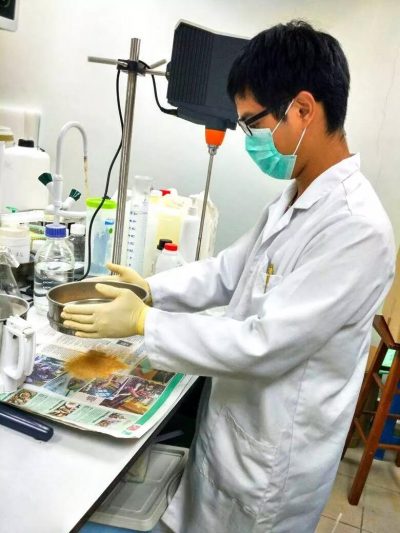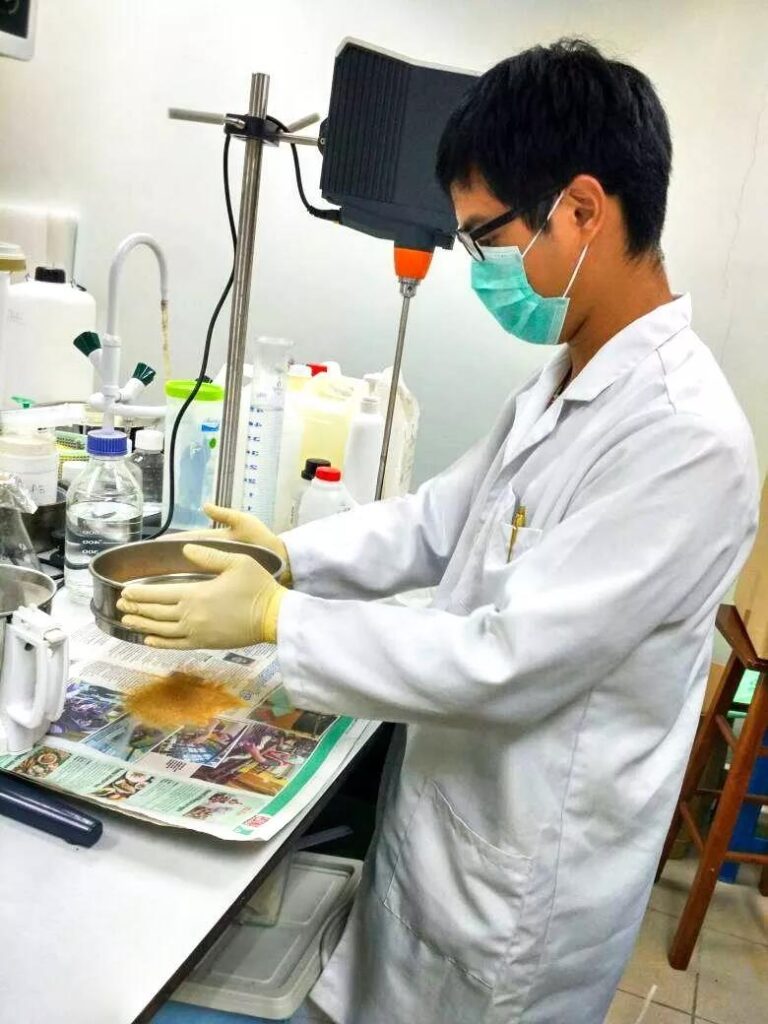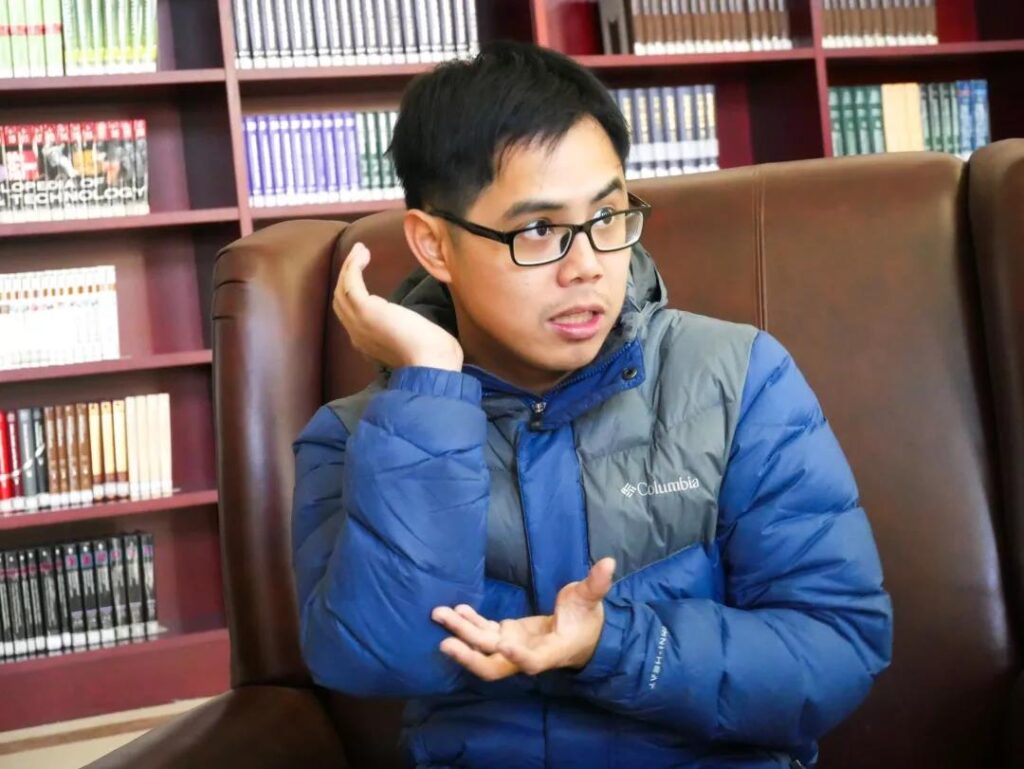
Unusual Diagnosis – A Doctor who Treats Plants
PEOPLE
2019.03.02
The wind was still cold at ten o’clock in the December morning of Beijing, the lack of warmth from the sun made people unconsciously wear an extra pair of gloves. At this moment, Qiu Ying Wei, who was dressed in thick clothes, was already at the gate of the Chinese Academy of Agricultural Sciences, ready to welcome the reporters from The Voice of Beijing. Qiu Ying Wei is currently a Ph.D student studying plant pathology at the Chinese Academy of Agricultural Sciences. As an international student in Malaysia, it seems to be a particularly new experience to be interviewed by younger students in a foreign country.

Back in Malaysia Form 6, Qiu Ying Wei was exposed to the compulsory subject, General Studies (Pengajian Am), which led him to ponder about food shortages. Therefore, when choosing his university’s major, Qiu Ying Wei decided to explore his interest and applied to the Plant Pathology major in the Department of Agriculture of the University of Putra Malaysia. In this field, what interested Qiu Ying Wei the most is the ability of the virus to continue to evolve and even mutate.

Plant pathology [1] (also: phytopathology) is an applied discipline that studies the pathogens, occurrence, development, and prevention of plant diseases. Under the research topic of plant diseases, it explores the causes of disease, or the process of infection and symptoms in the fields of anatomy, physiology or biochemistry. In order to more accurately prevent diseases and “prescribe the right medicine”, the environmental conditions that form the pathogen, the pathogen’s transmission route, the diagnosis method of the disease, and the pharmacological effects of disease-preventing agents on the pathogen or plant are all included in the research scope of phytopathology.
The ultimate goal of phytopathology is to extend the life of plants while minimizing losses during production. Qiu Ying Wei explained that most plant disease infections are caused by humans. For example, bringing into contact the virus-bearing tree sap with other plants will spread the virus and the plants may fall sick.
Pathogens are spread by wind, water, soil, seeds and animals, and reach the surface of the host body. They invade the host through natural holes (such as stomata, lenticels, nectaries, etc.) or wounds (such as mechanical trauma, insect-and-man-made wounds). Both the stratum corneum and epidermal cell wall on the surface of the host can resist the invasion of pathogens. The structure of the natural orifice of some hosts is not conducive to the invasion and development of pathogens, and some hosts contain compounds such as phenols, tannins, and ethylene that can limit or kill the invaded pathogens. Some hosts can also grow normally after being infected with pathogens, without suffering much economic loss due to the disease.

Qiu Ying Wei smiled and explained that some people think that if humans eat sick fruits and vegetables, it will have an impact on the body. In fact, there are many types of viruses, and viruses that affect plants will not pose a threat to the human body. According to the 2016 Nanyang Business Daily, Ganoderma disease, which is described by oil palm growers as a “plant cancer”, causes the country to lose about 1.2 billion ringgit each year. [2] Ganoderma disease is also called oil palm stem rot. [3] The virus rots the internal tissues of the stem. Except for the tenderest leaf and the central core leaf, which remained straight, the other petioles were broken and hung downward, and the dry leaf formed a cloak shape near the trunk. The living leaves also turned pale yellow, and finally the whole plant died.
Qiu Ying Wei found that most of his classmates who graduated with an undergraduate degree in the same year as him are either involved in oil palm production, or hold management positions in the private or state-owned enterprises. He feels that Malaysia lacks research talents in this area, which is not conducive to the development of agricultural research in our country. After finishing his Ph.D., when the time is right, he plans to return to Malaysia, to devote himself to education and continue to do research on plant pathology, and ultimately cure plant diseases. Qiu Ying Wei feels that the shortage of domestic teachers and the lack of research funds are the biggest problems and challenges in the field of domestic plant research. Although the Malaysian government has allocated research funds in its annual budget, it still does not play an effective role in promoting the overall research environment.

In order to find a better way to reduce the damage caused by Ganoderma disease to oil palm, Qiu Ying Wei thought about learning in China. Compared with the universities in Southeast Asia, the Chinese Academy of Agricultural Sciences has better teachers, as well as advanced equipment and environment for students to conduct experiments and research. If you want to stay in the country to study plant pathology, the Department of Agriculture at Putra University Malaysia is the top university in the country. In addition to China, you can also choose the University of Florida in the United States, which is also a relatively well-known university. It should be noted that in order to be in line with international standards, the Academy of Agricultural Sciences teaches all master’s and doctoral courses in English.
If you have completed an undergraduate course related to agricultural sciences, you may consider coming to the Chinese Academy of Agricultural Sciences to continue your postgraduate study. Qiu Ying Wei rubbed his hands very happily and made a welcome gesture. He thinks that the equipment here is relatively complete, and the research funds are relatively sufficient, therefore he believes that the students can get a good learning experience. After sending the interview team to the school gate, Qiu Ying Wei is ready to devote himself to research work and continue to work hard to solve plant diseases.
[1]https://baike.baidu.com/item/植物病理学/1173175?fr=aladdin
[2] http://www.enanyang.my/news/20160821/【独家】油棕灵芝病br-年损12亿元/amp/
[3] https://baike.baidu.com/item/油棕茎基腐病/6417461
Reporter ∣ Liu Wei Yu
Original Author ∣ Dong Jia Ren
Photographer ∣ Yvonne
Proofreader ∣ Yang Wen Fei, Luo You Rong
Additional Information ∣ Luo You Rong
WeChat Article Layout ∣ Xu Yi Ting
Web Article Layout | Wong Xiangyu
This web article is the English translation of the original article.
Editorial Board of The Voice of Beijing, 1st Issue, 2019
Edited and published by | AMSIB
Coordinator | Li Wei Ai, Vivian, Huang Xiao Qing
Producer | Li Jun Jin
Secretary | Wen Shi Yun, Wang Xuan Ming
Leader of the Interview Team | Cao Yi Wen, Yvonne
Reporter | Feng Qi Yang, Dong Jia Ren, Huang Jing Yi, He Jing Ling, Zhong Yi Wen, Liu Wei Yu, Huang Shi Xuan
Editor | Luo You Rong
Writer | Zhong Yi Wen, Chen Qian Jing, Zhou Yi Kang, Huang Jin Tai, Huang Mei Qi, Nur Aiin Binti Muhammad Azhar
Art Director | Yang Wen Fei
Art Editor| Chen Pei Xin, Xu Yi Ting, Yang Qian Hui, Zhou Yi Kang, Huang Mei Xuan, Huang Jin Tai

